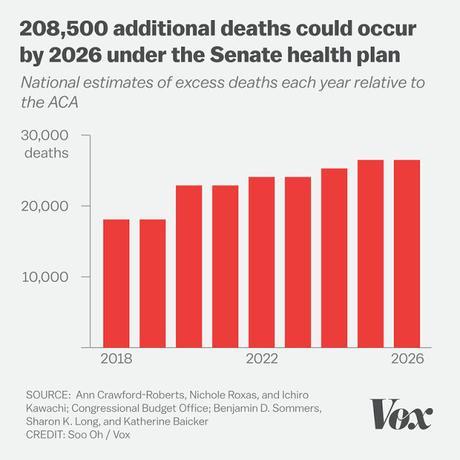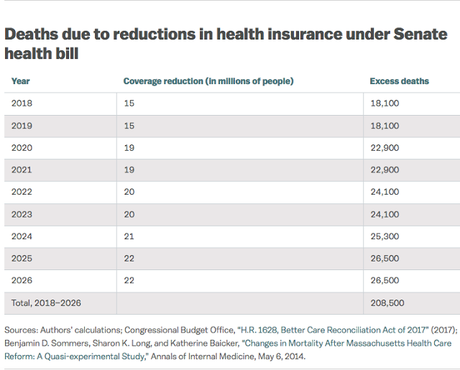

The charts above are from an article at Vox.com written by Ann Crawford-Roberts, Nichole Roxas, and Ichiro Kawachi. It concerns a study they have done on the effects of passing the GOP Senate plan (the Better Care Reconciliation Act of 2017) -- i.e., Trumpcare. They predict the passage of this odious plan will cause about 208,500 unnecessary deaths of American citizens by 2026. Here is just a part of their article:
The Congressional Budget Office projects that if the Senate Republicans’ health care bill becomes law, 14 million Americans will lose their health insurance in 2018, and, by 2026, 22 million would lose coverage. Drawing on that work, we estimate that if the Senate bill becomes law, 22,900 excess deaths will occur in 2020 — and the figure will grow over time. 26,500 extra deaths will take place in 2026. Over the next decade, we estimate that a total of 208,500 unnecessary deaths will occur if the law is passed (see Table 1). We also calculate anticipated additional deaths, state by state, using state-level coverage losses for the year 2026 (see Table 2). The predicted excess deaths by state range from 30 in North Dakota to 2,992 in California in 2026 alone. Some commentators have argued that it’s inappropriate — beyond the pale — to suggest that people will die as a result of this legislation. To the contrary, we contend that no debate over a health care policy can ignore evidence that it could have negative effects on health and mortality. In making these calculations, we draw on the scientific literature demonstrating that expanding health insurance reduces deaths. We specifically apply the results of a particularly robust study of the effects of health care reform in Massachusetts on mortality. Massachusetts’ health care reform — which expanded Medicaid, offered subsidized private insurance, and included an individual mandate — famously served as a model for the ACA. The Massachusetts study looked at county-level mortality data in 2001 to 2005 (pre-reform) and 2007 to 2010 (post-reform), and compared the changes to carefully selected control groups in other states that had not enacted health reform. For every 830 individuals insured, the authors found, one life was saved. In medical terms, 830 in this context is the “number needed to treat.” To put this into perspective, the colonoscopy number needed to treat is 1250; you need to conduct 1250 colonoscopy screenings to prevent one colorectal cancer death. Overall, in Massachusetts, insurance coverage expansion was associated with a 3 percent decline in mortality from all causes, and a 4.5 percent decrease in deaths from causes that are especially amenable to being prevented by health care — including heart disease, infection, diabetes, and cancer. Assuming that one death will occur for every 830 people who lose coverage is the same methodology used by the White House Council of Economic Advisers under the Obama administration to calculate reductions in mortality associated with the ACA. This methodology admittedly has limits. There are demographic and health workforce differences between Massachusetts and other states — the Massachusetts population is whiter, older, and more female, and has a higher per-capita physician rate than national averages. We also assume that losing insurance has the equal and opposite impact of gaining insurance; existing research focuses on the effects of gaining insurance. Further, we look only at mortality effects of insurance losses. It is possible that there are negative mortality effects of losing certain insurance benefits, or being required to pay higher premiums or deductibles, but we did not explore those.

